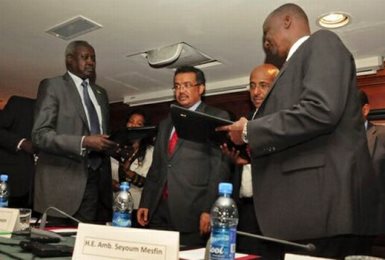Juba calls on rebels not to make “impossible demands”
March 31, 2014 (JUBA) – The South Sudanese government has called on the rebel group under the leadership of former vice-president Riek Machar not to obstruct the peace process by making “impossible demands”.

“The government has already shown strong commitment and willingness to bring peace, restore hope and security to this country,” South Sudan’s foreign affairs minister, Barnaba Marial Benjamin, told journalists on Monday
“Our delegation now in Addis Ababa is authorised to negotiate in good faith with the other side so that they come back to the country with peace, because peace is what our people need,” he added.
Marial called on the rebels not to impose impossible conditions during the current round of negotiations, urging them to engage in pro-active dialogue for the benefit of the South Sudanese people.
“Our people need peace. They don’t the need the war which has been imposed on them. I therefore call on the [rebel] side to heed the call of the people to accept peace through dialogue. All efforts must be made to avoid obstacles and impossible demands,” he said.
Meanwhile, Hussein Mar, spokesperson for the rebel Sudan People’s Liberation Movement in Opposition (SPLM-O), confirmed the two sides had reached a consensus on the general declaration of principles, as well as the agenda for negotiations.
The general declaration of principles outlines the main issues identified by the two parties, covering governance issues, democratisation and the general public sector reform, some of which are considered as conditions by the government.
The Intergovernmental Authority on Developing (IGAD) is expected to hold an official ceremony for the signing of the two documents.
Mar, who defected three months ago to the Machar-led rebellion, officially remained in his position as Jonglei’s deputy governor up until last week when the caretaker governor appointed a replacement.
He said the views of both sides would be amalgamated as part of the declaration on general principles, which would now form the basis of future talks.
“Hopefully, and by the God’s will, the IGAD envoys will amalgamate the two positions if all goes as we agreed. It is after the amalgamation of the two documents incorporating views representing the two sides that we hope the IGAD envoy will finally organise the signing function of the declaration of principles and agenda,” Mar told Sudan Tribune during an exclusive an interview on Sunday from the Ethiopian capital, Addis Ababa.
Rebels have demanded that seven senior politicians who were imprisoned for their alleged role in a plot to overthrow the government, but later released, be allowed to participate in talks.
They are also seeking interim arrangements which include swift reform in the structures of the governing party (SPLM), public service, security sector, foreign policy, as well as measures to promote good governance, adherence to rule of law and democratic principles.
The SPLM-O has also called the exclusion of rebel-stronghold Nasir from a joint monitoring and verification mechanism.
The government is pressing for the inclusion of the strategic Upper Nile state town, which sits on the River Nile near the border with Ethiopia, fearing it could be used as a supply chain for rebel forces.
Juba is also reluctant to discuss interim arrangements, specifically anything relating to the proposed limiting of presidential powers and period of service.
It initially threatened to boycott talks if the group of seven politicians were allowed to participate, insisting negotiations should be restricted to the direct two parties involved.
More than one million people have been displaced since political tensions erupted in violence in the capital, Juba, in mid-December last year before spreading to other key regions throughout the country.
The conflict has pitted pro-Machar rebels against government forces loyal to the Salva Kiir-led administration.
A tenuous ceasefire deal signed in the January round of talks has failed to halt violence on the ground, with both sides accusing each other of violating the terms of the agreement.
Aid agencies are warning of an imminent and catastrophic humanitarian situation if relief supplies do not reach affected communities ahead of the rainy season.
(ST)
